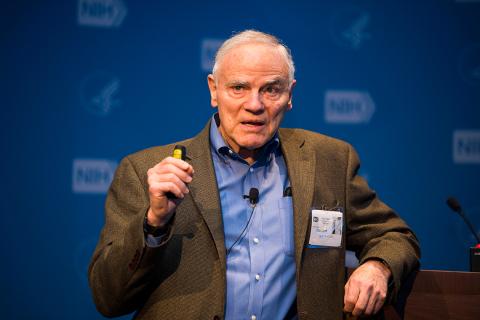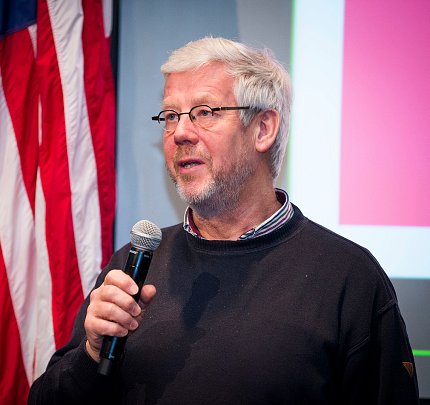Big Data Clouds Are Feeding Personalized Nutrition

Photo: Lisa Helfert
An apple a day doesn’t really keep the doctor away, but what if you knew what did, for you personally? Are there certain nutrients that complement your unique biology? To find out, there’s a growing menu of tech tools that can help people choose foods to fit their individual needs.
This emerging field of personalized nutrition is driven by vast amounts of genetic, lifestyle and other health data, which now can be generated and analyzed thanks to such innovators as renowned biologist Dr. Leroy Hood. His leadership of teams who developed automated DNA sequencers and other technologies paved the way for using big data in medical research.
“The analysis of this data will lead to actionable possibilities that could either improve wellness and/or let you prevent, or at least ameliorate, disease,” said Hood, chief science officer, Providence St. Joseph Health and chief strategy officer and cofounder, Institute for Systems Biology (ISB). He spoke at a recent NIDDK Office of Nutrition Research symposium in Lipsett Amphitheater.
Advances in digital health are shifting medicine from a population-based, reactive model to one that’s individualized, proactive and focused not just on disease, but also on wellness, said Hood. He calls this approach P4 health, a system that’s predictive, preventive, personalized and participatory.
With dynamic data clouds at the heart of their research, ISB recently piloted a year-long nutrition and wellness project—the Pioneer 100 Study. It sequenced the genomes of 108 people, conducted quarterly blood and stool tests, monitored lifestyle through digital gadgets and provided wellness coaching.

Photo: Lisa Helfert
Most clinical anomalies among participants were easily addressed through dietary intervention, said Hood. Participants who were pre-diabetic saw their blood sugar drop substantially with dietary changes. Some of the pioneers with dangerously low levels of vitamin D learned they had one or more variant genes that blocked the vitamin’s absorption. These people needed to take much larger doses to compensate.
“The pioneers loved the idea they could make their own health decisions and that the genome doesn’t control your destiny, rather just your potential,” said Hood.
One pioneer had arthritis in his knees and found little relief through medication, recounted Dr. Nathan Price, professor and associate director of ISB. Lab tests showed the man had an abnormally high ferritin level (a marker of iron status); his genome sequence revealed he was genetically predisposed to hemochromatosis, a condition of iron overload that, if untreated, ultimately leads to damage to the heart, liver and pancreas and can be fatal. Cartilage damage is an early sign of this disease. After he was referred to his doctor, who diagnosed him with hemochromatosis, the man started donating blood monthly to shed the excess iron, which prevented the development of more serious organ damage.
“Because he was empowered with this knowledge, he could make a very simple decision and eliminate his disease trajectory from his future,” said Price.
Several pioneers with high mercury levels all ate tuna sushi multiple times a week, Price noted. They all brought the level under control by reducing their intake or switching to low-mercury fish. Others saw dramatic improvements in blood pressure, inflammation and cholesterol levels and, in the process, may have averted potential cardiovascular disease triggers.
“You could take someone who’s at high genetic risk,” said Price, “and turn them into someone having low actual risk by a nutritional intervention that affects the functioning of this relevant pathway.”

Photo: Lisa Helfert
Personalizing nutrition relies on our body’s ability to be flexible, said Dr. Ben van Ommen, principal scientist and director, TNO (Organization for Applied Scientific Research) in the Netherlands.
If, for example, van Ommen consumed 75 grams of glucose, his body would compensate for the spike in that molecule, though that single dose for a time affected his blood pressure, cholesterol and other bodily processes. If he was diabetic or obese, his system would be less flexible. He could take a pill to block the glucose, but as other systemic problems emerged, he’d need more kinds of medication.
“It’s good for pharma, not good for physiology,” van Ommen said. “It does not optimize my flexibility. That’s why personalized nutrition is so key to health.”
In Europe, citizens are banding together to create a health data cooperative in which every participant is a co-owner and controls what happens to his or her data. With enough participants, the cooperative offers negotiating power with researchers, hospitals and the food industry.
“There needs to be an economy that thrives on making me healthy, not on keeping me ill, like these pills [would],” said van Ommen.
The human body needs all the help it can get to regulate itself and keep all systems in balance, said Dr. Josh Anthony, vice president of global R&D, nutrition and regulatory affairs at Campbell Soup Co. and founding chief science officer of Habit LLC.
“If we’re measuring components in a fasting state, often it’s not until you see biomarkers that are at such a point of dysregulation that you’re already in frank disease [and at that point, medication is needed],” said Anthony. “The opportunity here is how can we act earlier to be able to utilize nutrition as an intervention?”

Photo: Lisa Helfert
That’s where technology comes in, with the goal of creating accessible personalized nutrition programs. One such program, Arivale, born from the Pioneer pilot study, is promoting wellness among thousands of patients using data analysis and coaching. Hood and Price said they’re already starting to see biomarkers that may help identify nutritional and other interventions earlier.
Habit LLC uses a mixed meal challenge beverage as part of a test to get an early read on metabolic flexibility in combination with genetics, blood biomarkers, lifestyle and health goals data. It then delivers a personalized nutrition plan online, along with personalized coaching. Consumer nutrition-based pilot studies have shown improved dietary patterns, lower cholesterol and improvements in weight loss, waist circumference and BMI, among the health gains, said Anthony.
“We’re looking for personalized approaches to drive improved health outcomes and for results to be sustainable over time,” he said.
Behavior change can be challenging and these programs rely on participants faithfully implementing the recommendations over time. Would you make the right dietary choices with this knowledge? That’s another story. For those who want to try, the technology is at your fingertips.
